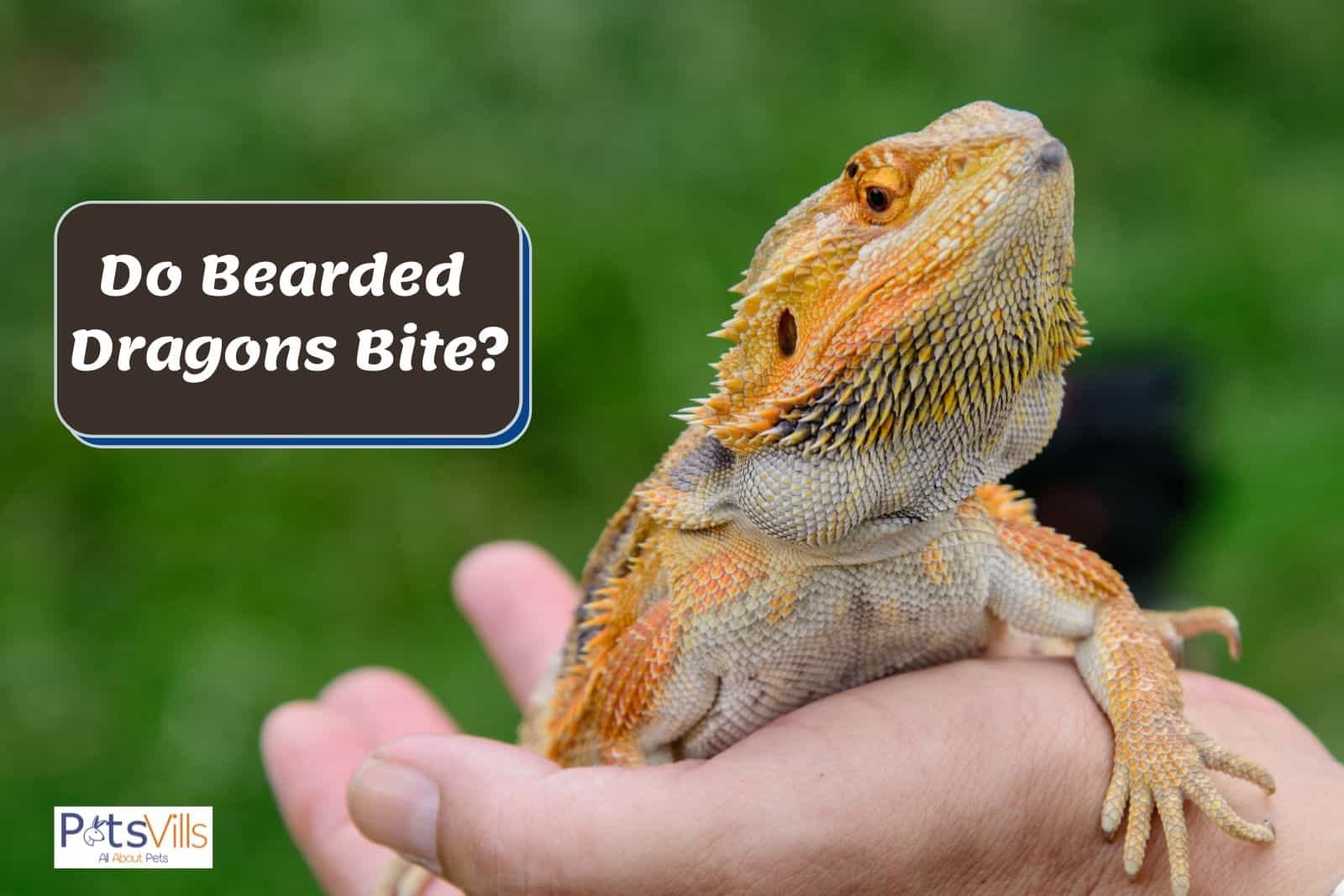Do bearded dragons bite?
Yes, they do for a variety of reasons, including overexcitement, hunger, or provocation…but this doesn’t happen often.
If you’re planning to own a beardie or own one and want to know how aggressive they can be, please keep reading.
I will discuss why they bite, if it hurts, and how to prevent them from biting.
READ MORE: How Do Bearded Dragons Sleep?
Table of Contents
Why Do Bearded Dragons Bites? Reasons To Know About
As mentioned earlier, it’s infrequent for a bearded dragon to bite you. But when they do, it could be one or a couple of the following reasons.
#1 They’re Defending Themselves
If your bearded dragons are feeling threatened or unsafe, they may react by biting. Being prey animals, beardies are used to predators attacking them from various sides.
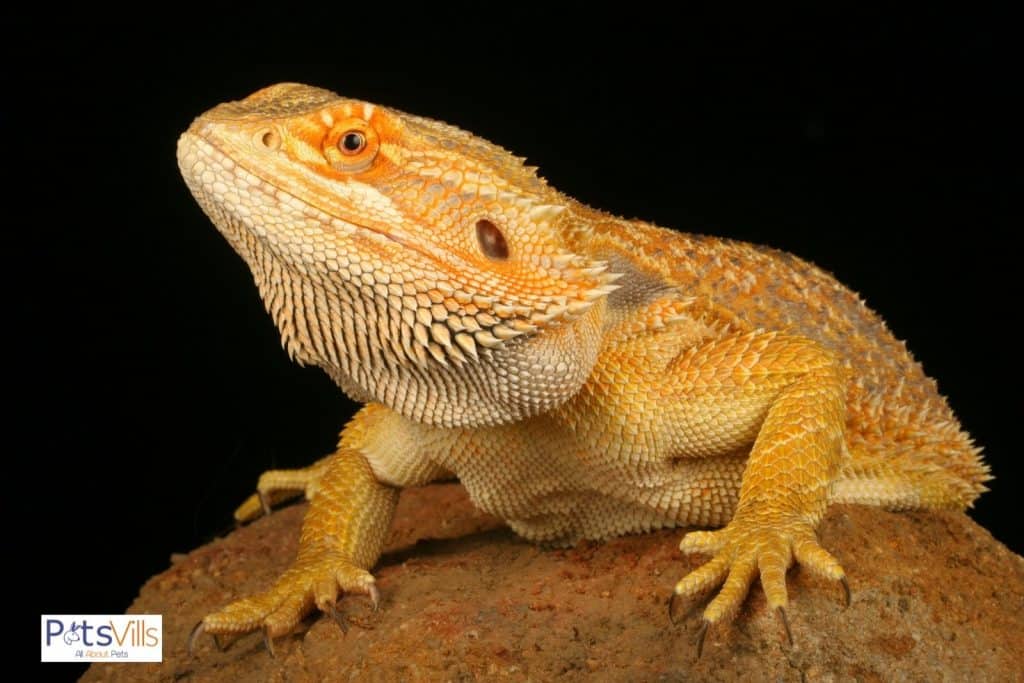
So, if you suddenly appear at the top of their tank and try to grab them, they may react by biting. To avoid this, try approaching them from the side.
Another reason they may feel unsafe is if they are not familiar with the environment.
If you just got your bearded dragon and they are not used to you or anyone else in the family. They’ll feel scared and bite every time they think they are in danger.
The pets you have at home can also pose a threat to your beardie. Dogs and cats are curious, and they’ll sometimes pep around the beardy’s tank even though they are not planning to eat them.
Bearded dragons can also feel threatened by seeing their reflection. So, make sure none of the sections of the tank act as a mirror.
When feeling threatened, bearded dragons will hiss, puff up, and their beard will turn black. Watch out for these signs and let your pet cool down before trying to pick them up.
ALSO CHECK: Do Bearded Dragons Like Being Pet
#2 Overexcitement or Anxiety
Like other pets, bearded dragons can have bursts of excitement and energy due to various reasons, including mealtime, or they are just excited to see you. When in such a “mood,” the beardies may bite you.
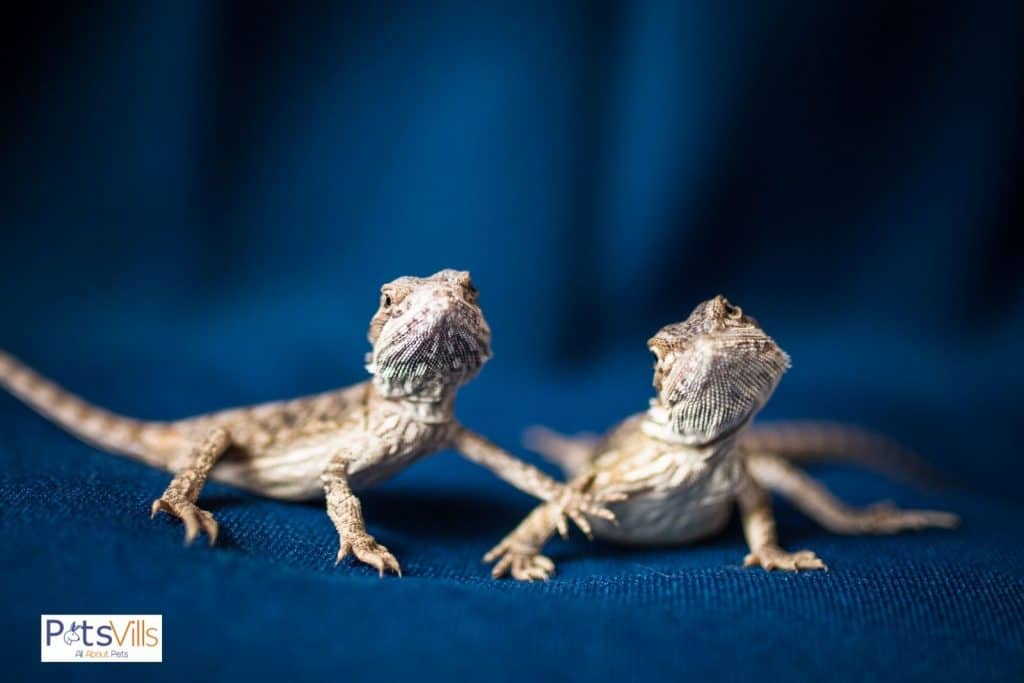
Like I mentioned earlier, beardies can also feel uneasy and anxious due to a change in environment.
It may be the first time you are bringing them home, or you changed something about the tank or the room you placed them in.
If your bearded dragons are sick or in pain, they may feel anxious and bite every time you try to handle them.
If you notice lethargy, dragging of the hind legs, or any other symptoms that aren’t normal, contact your vet as soon as possible.
#3 Poor Handling
If you don’t handle your pet bearded dragon the right way, they will bite. SO, what’s the best way to hold a beardie?
Avoid pinching them, don’t be too tight when holding them, and don’t poke them.
Mishandling startles them, and you’ll notice hissing and puffing up leading up to a bite.
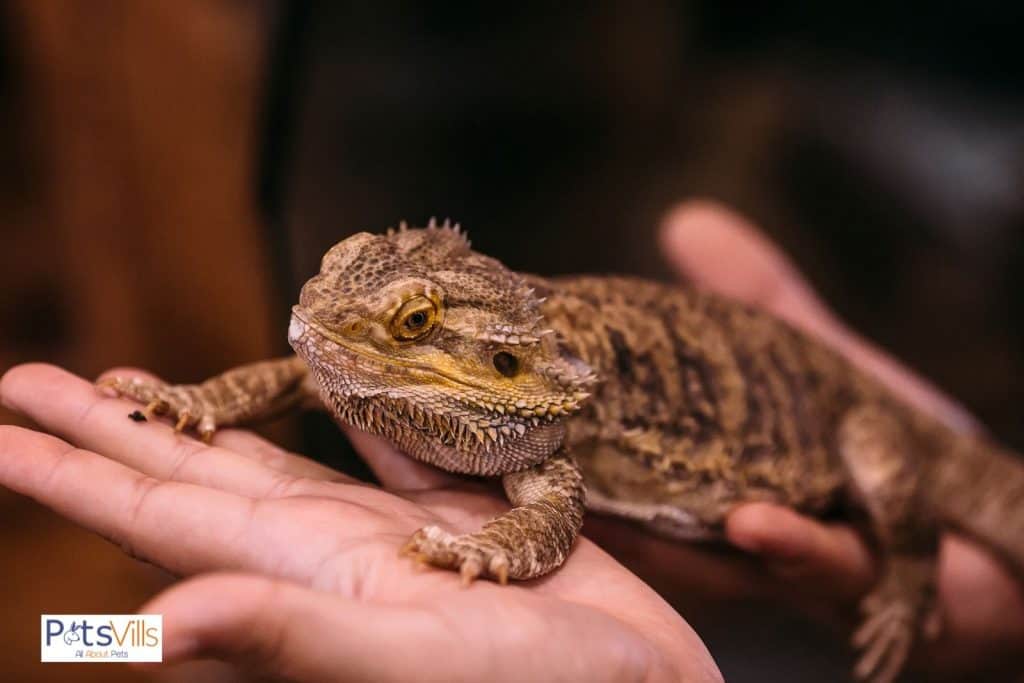
Kids are also known to be too rough when holding pets without being aware they could be hurting them. So, teach your kids and everyone else in your household the best ways to handle the pet beardie.
Besides biting you, you could also injure your beardie. For instance, if you pick up your pet and there’s a considerable drop when he bites, you’ll be tempted to drop him, causing injuries. If it’s the first time for you or your kids to handle the pet, make sure it’s an area that both of you won’t get hurt.
#4 Poor Socialization
Bearded dragons are wild animals, and they don’t see many people in their natural habitats. That’s why if your pet dragon has not familiarized himself with having people around, he may get aggressive and bite.
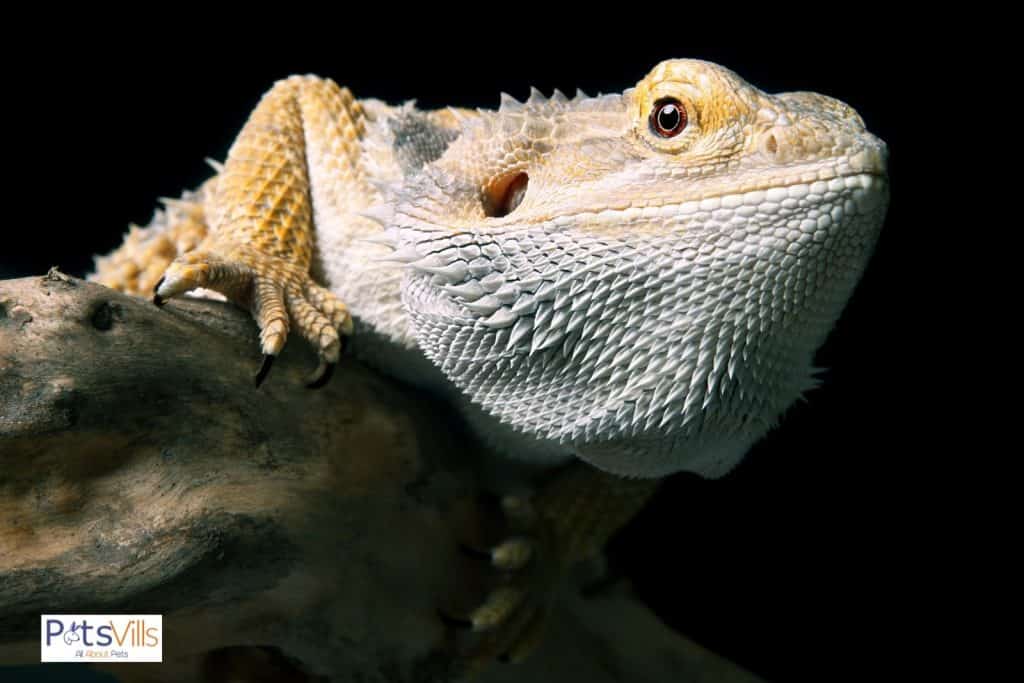
Breeders and rescue centers ensure that bearded dragons are socialized, but you still have to do your part. So, when you get your pet home, bond with them and let them get used to being handled at their own pace.
#5 Hunger
An accidental bite can also happen due to hunger. Most bearded dragon owners are used to feeding their pets using their hands. And sometimes, beardies won’t tell the difference between your fingers and the food, especially when they are starving.
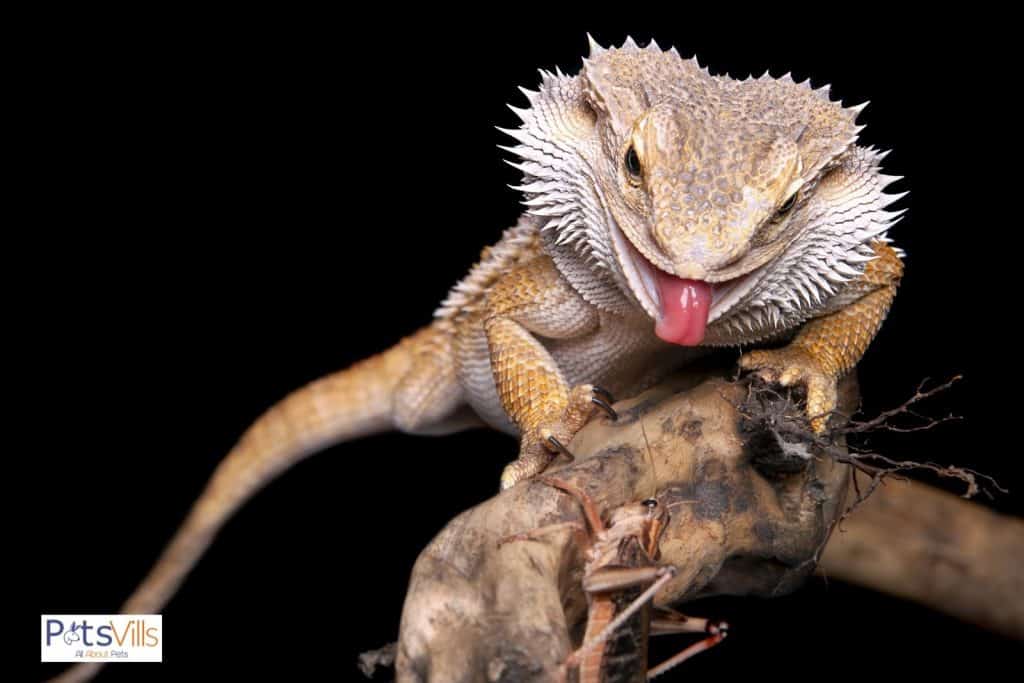
Also, if you touch some of their food before handling them, your hands will retain that smell, and beardies will mistake them for food.
To avoid this, either wash your hands before handling them or use tongs to feed them.
Find out the kinds of beardie bites here:
Does A Bearded Dragon Bite Hurt?
A bearded dragon’s bite may or may not hurt depending on the age, size, and amount of force exerted on the bite.
Beardies have several sharp teeth [1], but younger beardies may not have enough strength to break your skin.
On the other hand, adult bearded dragons may break your skin, but it’s not that painful. It’s more of a tingling sensation.
Why they are biting you may also determine whether it’s going to hurt or not. If they mistook your fingers for food, the nip would be gentler compared to if they thought you were a threat.
Besides hurting you, you could also end up with an infection if you don’t treat the wound ASAP (more on this later).
Bearded dragons carry salmonella bacteria [2] which they can spread to their surroundings, including you.
Check out this video to learn if bearded dragon bites hurt:
What to Do if a Bearded Dragon Bites You?
How you react when a bearded dragon bites you matters a lot since it prevents further damage. Below is what you need to do.
Be Calm
Please don’t freak out and drop your pet since this will hurt them. In most cases, they are just biting as a warning or as a way of communicating that they don’t like what you’re doing.
If the bearded dragon is still holding on to your finger, don’t pull it out just yet. Pulling out abruptly will only make the teeth sink deeper.
Hold the Lower Body
Don’t let the pet hang as they cling to your fingers or any other part where they are biting. Instead, support their lower body and make sure they feel they are secure. This will let them know that they can let go.
Open Their Jaws
Once they are relaxed, hold the upper and lower jaws and pull gradually until they let go.
How to Treat a Bearded Dragon Bite Wound
As mentioned earlier, a bearded dragon’s bite could be dangerous. If the teeth didn’t break your skin, washing your hands with soap is enough.
But if it did break your skin, you MUST disinfect the wound to prevent infections.
Wash your hands with warm water and soap, and disinfect them with antiseptic wipes, hydrogen peroxide, Neosporin, or alcohol.
After disinfecting it, you can bandage it for a few days to prevent further contamination.
Antiseptic wipes are also helpful even though the teeth don’t break your skin since they can kill bacteria from the bearded dragon’s mouth.
How to AVOID/STOP a Bearded Dragons FROM Biting
Below are some of the ways to stop your bearded dragon from biting;
- Set up a consistent regular feeding time to prevent them from getting too hungry.
- Always wash your hands and rinse them before handling them.
- Don’t pinch, poke, or startle your pet.
- Avoid approaching them from the top. Always do it from the back, side, or front.
- When holding them, do it gently by placing one of your hands under the belly, and the tail should always be on your forearm. If they are too young, let them hold on to your finger with their front legs.
- Don’t pick them up if they start hissing, puffing up, and turning black.
- While you shouldn’t hold them tightly, hold them in a way that they can’t easily fall.
- If they squirm like they don’t want to be held, or run away from you, just let them and try again later.
- Never flip your bearded dragons so that they lie on their side.
- Always handle your guinea pig from an area where they can’t get injured.
Other Bearded Dragons Behaviors and What They Mean
Below are other behaviors bearded dragons may exhibit.
Waving
You may have seen your beardies wave at you and thought they were saying “hi.”
While that would be cute, it’s far from what they’re actually doing. So, why do bearded dragons wave? It’s a sign of submission.
Beardies live in a social structure where there’s an alpha and a beta. Alphas nod their heads to show dominance while betas wave to show submission.
If your bearded dragon is alone in the cage, they could be waving at their reflection on the glass because they are scared. Other reasons why they may wave include;
- Younger beardies are communicating.
- Time for mating
- Wrong tank design and dimensions.
This is how a beardie waves:
Opening Their Mouth
Why do bearded dragons open their mouth? It’s a way of regulating their temperature, especially when it’s too hot.
It can also be a sign of aggression and asserting dominance, but that’s also accompanied by hissing. If the bearded dragon mouth open is continues, then you might want to check the tank’s temperature.
Make sure one section has cooler temperatures where they can cool down.
Black Beard
Blackening of the beard happens when they are threatened, stressed, or sick. If they are not hissing, then they are most likely sick. Visit your vet as soon as possible to know what’s the problem and how to fix it.
Watch a more detailed explanation here:
Glass Surfing
If the cage is too small for your beardies, you’ll see them surfing against the glass.
Other reasons include lack of enough light or if there are some aggressive beardies in the cage. Since they are stressed, they will also most likely have a black beard.
Check out this guru’s explanation:
Digging
This is another habit they may engage in when they are stressed or feeling threatened. They could be digging in the tank’s sand or outdoors if you choose to take them outside.
Bearded dragons also dig when they want to lay eggs or when they are preparing for the brumation season. Others may be digging because they are hungry.
Make sure you give them enough food and make sure it’s the right food based on their age.
Baby bearded dragons should mostly eat insects as they grow, while an adult’s diet should consist of 75% plants and 25% insects.
Head Bobbing
Head bobbing is a behavior used by male beardies to show dominance.
If another bearded dragon is challenging them in their territory, they will nod their head rapidly until the other bearded dragon shows submission. If it does, they can engage in a physical fight that involves biting.
Other times, they will not intimidate them but just let them know that they acknowledge the other bearded dragon’s presence. Female beardies can also bob their heads to show they are ready to mate.
This is how it looks like:
Eye Bulging
There are many theories as to why beardies bulge their eyes. The most common is they do it to ease the shedding process. Shedding doesn’t occur in beardies as easily as it occurs in snakes and other reptiles.
So, the bulge is supposed to help with that. This theory is true to some extent since most owners have reported seeing their pet’s eyes bulge when shedding.
Another theory states that they are altering their blood pressure, while others say it’s because their eyes feel itchy. If they do it often, even after shedding, consult a vet.
Tail Twitching
Bearded dragons can twitch their tails in anticipation when hunting or if they’re stressed. Twitching is also associated with metabolic bone disease [3], so make sure you have them checked by a vet.
READ MORE: Do Bearded Dragons Make Noises?
FAQS
Do Bearded Dragons Like Being Held?
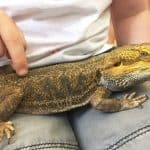
Yes, they do. After some bonding sessions, beardies come to love their owners and enjoy any form of petting, including holding and cuddling. But make sure you do it right without squeezing them or startling them.
Do Bearded Dragons Bite Hard?
Not really. Often, their bites fill like a sting, but they may bite hard if you try to pull them away abruptly. How hard they bite also depends on their size and weight.
Are Bearded Dragons Venomous?
No, they are not toxic to people. Bearded dragon teeth are sharp and may inflict mild injuries and transfer some bacteria, but their mild venom does not affect humans.
Do Bearded Dragons Become Attached To their Owners?
Yes. Like any other pets, bearded dragons will get attached to you and long for spending time with you. But how fast they get attached to you varies. So, be patient if your pet still chooses to be independent.
How Do I Know IF My Bearded Dragon Wants to Be Held?
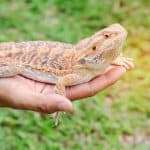
Just approach them from the side, back, or from the front and try to hold them. If they run, hiss, puff up or turn black, they don’t want to be held. But if they are relaxed as you hold them, they are happy, affectionate, and ready to be held.
How Often Should You Handle Your Bearded Dragons?
You can hold and pet your beardies for as long as you like, as long as they are comfortable with it. If they get skittish, put them down gently and leave them for some time.
Conclusion
Can bearded dragons bite? Yes. Is it painful? Not really, but it can be and dangerous too if they transfer bacteria. But bearded dragons don’t bite often.
And if you handle them carefully, feed them the right food at the right time and in a regular feeding schedule, and ensure they are calm, they may never bite you.
References
- Do Bearded Dragons Have Teeth? (2020, April 7). Retrieved November 26, 2021, from Vet Explains Pets website: https://vetexplainspets.com/do-bearded-dragons-have-teeth/#:~:text=Summary%3A,as%20ours%20in%20many%20ways
- Outbreak of Salmonella Infections Linked to Pet Bearded Dragons. (2021). Retrieved November 26, 2021, from https://www.cdc.gov/salmonella/muenster-10-20/index.html#:~:text=Bearded%20dragons%20can%20carry%20Salmonella,the%20area%20where%20they%20live
- Bearded Dragons – Diseases. (2021). Retrieved November 26, 2021, from vca_corporate website: https://vcahospitals.com/know-your-pet/bearded-dragons-diseases#:~:text=Metabolic%20bone%20disease%20(MBD)%2C,less%20than%202%20years%20old
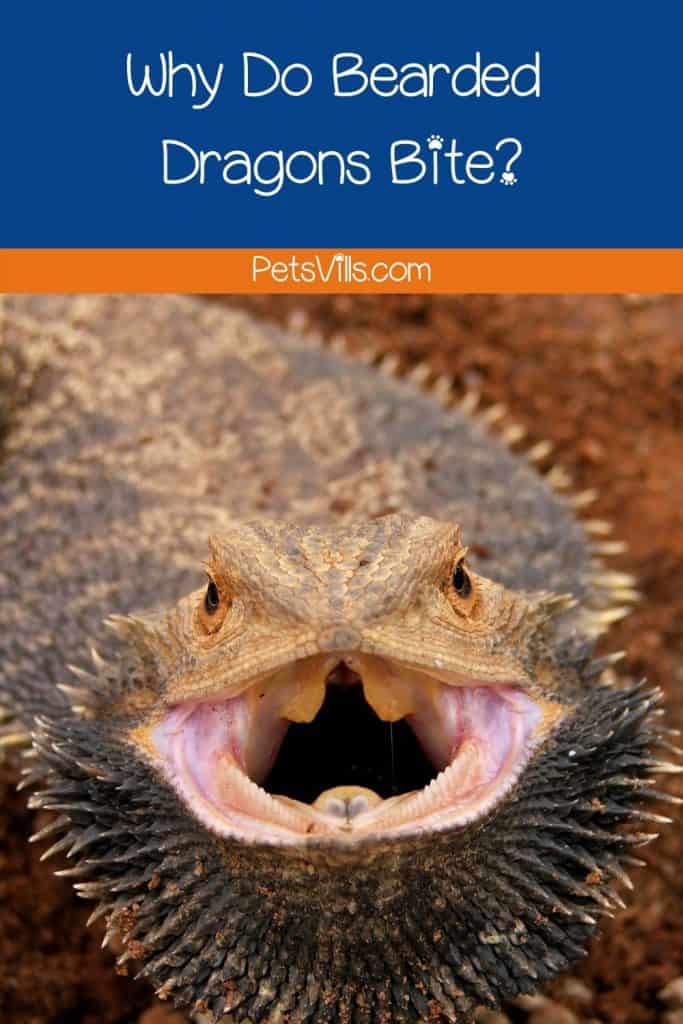
Have you been bitten by a bearded dragon? Do you know someone who has? What was your experience? Feel free to share with us below!
Barry Stingmore is a British content writer living in Fuerteventura, Spain. An animal lover at heart, he shares his home with a dog and four rescue cats and has a passion for writing about animals big and small.
Barry loves finding answers to your animal-related questions, the more research involved the better! You can rely on him to find the facts.
Find him on FACEBOOK, TWITTER AND Linkedin
Read his latest ARTICLES.
Find more about him HERE.

